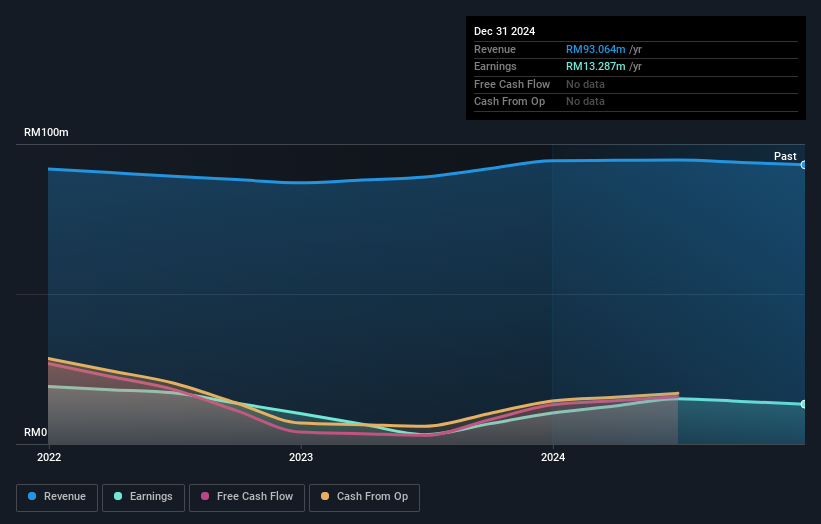
Key Insights
- Insiders appear to have a vested interest in UTS Marketing Solutions Holdings' growth, as seen by their sizeable ownership
- 60% of the business is held by the top 2 shareholders
- Ownership research, combined with past performance data can help provide a good understanding of opportunities in a stock
A look at the shareholders of UTS Marketing Solutions Holdings Limited (HKG:6113) can tell us which group is most powerful. The group holding the most number of shares in the company, around 75% to be precise, is individual insiders. Put another way, the group faces the maximum upside potential (or downside risk).
Clearly, insiders benefitted the most after the company's market cap rose by HK$300m last week.
Let's delve deeper into each type of owner of UTS Marketing Solutions Holdings, beginning with the chart below.
View our latest analysis for UTS Marketing Solutions Holdings

What Does The Lack Of Institutional Ownership Tell Us About UTS Marketing Solutions Holdings?
Small companies that are not very actively traded often lack institutional investors, but it's less common to see large companies without them.
There could be various reasons why no institutions own shares in a company. Typically, small, newly listed companies don't attract much attention from fund managers, because it would not be possible for large fund managers to build a meaningful position in the company. It is also possible that fund managers don't own the stock because they aren't convinced it will perform well. Institutional investors may not find the historic growth of the business impressive, or there might be other factors at play. You can see the past revenue performance of UTS Marketing Solutions Holdings, for yourself, below.

Hedge funds don't have many shares in UTS Marketing Solutions Holdings. Because actions speak louder than words, we consider it a good sign when insiders own a significant stake in a company. In UTS Marketing Solutions Holdings' case, its Top Key Executive, Chee Ng, is the largest shareholder, holding 41% of shares outstanding. With 19% and 15% of the shares outstanding respectively, Koon Lee and Kah Kwan are the second and third largest shareholders. Note that two of the top three shareholders are also Chief Executive Officer and Member of the Board of Directors, respectively, once again pointing to significant ownership by company insiders.
A more detailed study of the shareholder registry showed us that 2 of the top shareholders have a considerable amount of ownership in the company, via their 60% stake.
Researching institutional ownership is a good way to gauge and filter a stock's expected performance. The same can be achieved by studying analyst sentiments. We're not picking up on any analyst coverage of the stock at the moment, so the company is unlikely to be widely held.
Insider Ownership Of UTS Marketing Solutions Holdings
The definition of an insider can differ slightly between different countries, but members of the board of directors always count. Management ultimately answers to the board. However, it is not uncommon for managers to be executive board members, especially if they are a founder or the CEO.
Insider ownership is positive when it signals leadership are thinking like the true owners of the company. However, high insider ownership can also give immense power to a small group within the company. This can be negative in some circumstances.
Our information suggests that insiders own more than half of UTS Marketing Solutions Holdings Limited. This gives them effective control of the company. Given it has a market cap of HK$1.3b, that means they have HK$942m worth of shares. Most would be pleased to see the board is investing alongside them. You may wish to discover (for free) if they have been buying or selling.
General Public Ownership
The general public-- including retail investors -- own 25% stake in the company, and hence can't easily be ignored. While this size of ownership may not be enough to sway a policy decision in their favour, they can still make a collective impact on company policies.
Next Steps:
I find it very interesting to look at who exactly owns a company. But to truly gain insight, we need to consider other information, too. Consider for instance, the ever-present spectre of investment risk. We've identified 2 warning signs with UTS Marketing Solutions Holdings , and understanding them should be part of your investment process.
Of course this may not be the best stock to buy. So take a peek at this free free list of interesting companies.
NB: Figures in this article are calculated using data from the last twelve months, which refer to the 12-month period ending on the last date of the month the financial statement is dated. This may not be consistent with full year annual report figures.
Have feedback on this article? Concerned about the content? Get in touch with us directly. Alternatively, email editorial-team (at) simplywallst.com.
This article by Simply Wall St is general in nature. We provide commentary based on historical data and analyst forecasts only using an unbiased methodology and our articles are not intended to be financial advice. It does not constitute a recommendation to buy or sell any stock, and does not take account of your objectives, or your financial situation. We aim to bring you long-term focused analysis driven by fundamental data. Note that our analysis may not factor in the latest price-sensitive company announcements or qualitative material. Simply Wall St has no position in any stocks mentioned.